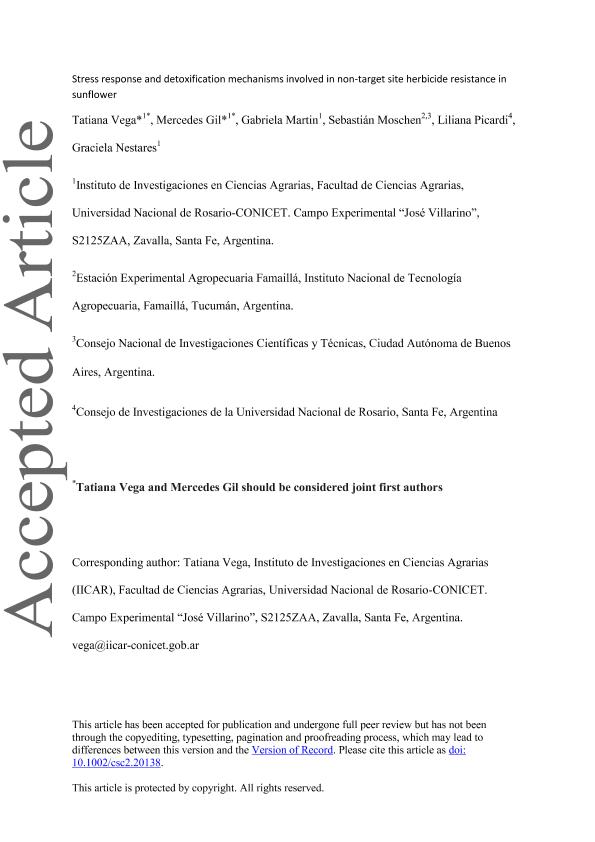Artículo
Stress response and detoxification mechanisms involved in non-target-site herbicide resistance in sunflower
Vega, Tatiana Alejandra ; Gil, Mercedes
; Gil, Mercedes ; Martin, Gabriela Luciana; Moschen, Sebastián Nicolás
; Martin, Gabriela Luciana; Moschen, Sebastián Nicolás ; Picardi, Liliana Amelia; Nestares, Graciela María
; Picardi, Liliana Amelia; Nestares, Graciela María
 ; Gil, Mercedes
; Gil, Mercedes ; Martin, Gabriela Luciana; Moschen, Sebastián Nicolás
; Martin, Gabriela Luciana; Moschen, Sebastián Nicolás ; Picardi, Liliana Amelia; Nestares, Graciela María
; Picardi, Liliana Amelia; Nestares, Graciela María
Fecha de publicación:
07/2020
Editorial:
John Wiley & Sons
Revista:
Crop Science
ISSN:
0011-183X
e-ISSN:
1435-0653
Idioma:
Inglés
Tipo de recurso:
Artículo publicado
Clasificación temática:
Resumen
The nature of non-target-site herbicide resistance (NTSR) to imidazolinone (IMI) in HA425 sunflower (Helianthus annuus L.) has not yet been fully characterized but could be related to xenobiotic metabolism. The objective of this study was to evaluate the role of cytochrome P450 monooxygenases (P450s) and other detoxification-related proteins in NTSR in sunflower. Two sunflower inbred lines were used: HA 425, which is IMI resistant (Imisun), and HA 89, which is IMI susceptible. The growth response to the IMI herbicide imazethapyr in combination with the P450 inhibitors 1-aminobenzotriazole (ABT) or piperonyl butoxide (PBO) was evaluated in 15-d-old sunflower plantlets. Roots were collected, and label-free quantitation (LFQ) proteomic analysis was carried out to characterize the NTSR mechanisms involved in the IMI resistance trait in sunflower. The increased phytotoxicity of imazethapyr observed in the resistant line when ABT or PBO were present agrees with the hypothesis that NTSR mechanisms may contribute to herbicide resistance in sunflower. The herbicide treatment also led to changes in the levels of biotic and abiotic stress-related proteins, glutathione S-transferases, and cytochrome P450s, among others. Plant growth and root protein expression response to IMI herbicides in sunflower would be a combination of stress-related and detoxification mechanisms. Understanding the basis of NTSR becomes helpful to exploit this trait in sunflower crop and to develop xenobiotic-resistant, soil-remediating cultivars.
Archivos asociados
Licencia
Identificadores
Colecciones
Articulos(IICAR)
Articulos de INST. DE INVESTIGACIONES EN CIENCIAS AGRARIAS DE ROSARIO
Articulos de INST. DE INVESTIGACIONES EN CIENCIAS AGRARIAS DE ROSARIO
Citación
Vega, Tatiana Alejandra; Gil, Mercedes; Martin, Gabriela Luciana; Moschen, Sebastián Nicolás; Picardi, Liliana Amelia; et al.; Stress response and detoxification mechanisms involved in non-target-site herbicide resistance in sunflower; John Wiley & Sons; Crop Science; 60; 4; 7-2020; 1809-1822
Compartir
Altmétricas



